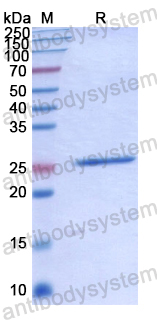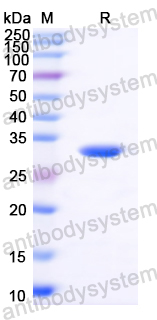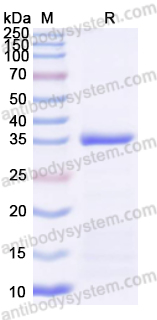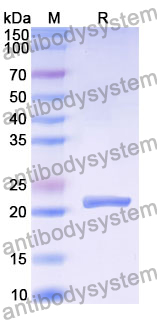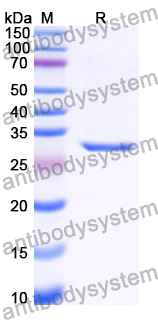Catalog No.
YHJ41301
Expression system
E. coli
Species
Homo sapiens (Human)
Protein length
Gln3-Gln236
Predicted molecular weight
26.79 kDa
Nature
Recombinant
Endotoxin level
Please contact with the lab for this information.
Purity
>90% as determined by SDS-PAGE.
Accession
Q96PD5
Applications
ELISA, Immunogen, SDS-PAGE, WB, Bioactivity testing in progress
Form
Lyophilized
Storage buffer
Lyophilized from a solution in PBS pH 7.4, 0.02% NLS, 1mM EDTA, 4% Trehalose, 1% Mannitol.
Reconstitution
Reconstitute in sterile water for a stock solution. A copy of datasheet will be provided with the products, please refer to it for details.
Shipping
In general, proteins are provided as lyophilized powder/frozen liquid. They are shipped out with dry ice/blue ice unless customers require otherwise.
Stability and Storage
Use a manual defrost freezer and avoid repeated freeze thaw cycles. Store at 2 to 8°C for frequent use. Store at -20 to -80°C for twelve months from the date of receipt.
Alternative Names
PGLYRPL, PGLYRP2, PGRP-L, PGRPL, N-acetylmuramoyl-L-alanine amidase, Peptidoglycan recognition protein 2, Peptidoglycan recognition protein long
Identifcation of candidate biomarkers for polyarteritis nodosa using data-independent acquisition mass spectrometry., PMID:39959243
Bacterial and host enzymes modulate the inflammatory response produced by the peptidoglycan of the Lyme disease agent., PMID:39829805
Circadian Rhythm Disruption in Hepatocellular Carcinoma Investigated by Integrated Analysis of Bulk and Single-Cell RNA Sequencing Data., PMID:38891936
Naïve Inflammatory Proteome Profiles of Glucocorticoid Responsive Polymyalgia Rheumatica and Rheumatic Arthritis Patients-Links to Triggers and Proteomic Manifestations., PMID:38793033
Novel role of peptidoglycan recognition protein 2 in activating NOD2-NFκB inflammatory axis in coronary artery disease., PMID:38277990
Plasma proteome profiling reveals the therapeutic effects of the PPAR pan-agonist chiglitazar on insulin sensitivity, lipid metabolism, and inflammation in type 2 diabetes., PMID:38182717
Sex Differences in the Allele Distribution of PGLYRP2 Variant rs892145 in Parkinson's Disease., PMID:38106542
Analysis of Plasma Proteins Involved in Inflammation, Immune Response/Complement System, and Blood Coagulation upon Admission of COVID-19 Patients to Hospital May Help to Predict the Prognosis of the Disease., PMID:37371071
Association of PGLYRP2 gene polymorphism and sporadic Parkinson's disease in northern Chinese Han population., PMID:35218888
Proteomic analysis of aqueous humor in canine primary angle-closure glaucoma in American Cocker Spaniel dogs., PMID:34558166
PGLYRP2 as a novel biomarker for the activity and lipid metabolism of systemic lupus erythematosus., PMID:34461924
Bacitracin Methylene Disalicylate Improves Intestinal Health by Modulating Its Development and Microbiota in Weaned Rabbits., PMID:34248860
Proteomic identification of biomarkers in maternal plasma that predict the outcome of rescue cerclage for cervical insufficiency., PMID:33857242
Peptidoglycan Recognition Peptide 2 Aggravates Weight Loss in a Murine Model of Chemotherapy-Induced Gastrointestinal Toxicity., PMID:33833993
Antibody to peptidoglycan recognition protein (PGLYRP)-2 as a novel biomarker in rheumatoid arthritis., PMID:33427621
Single Nucleotide Polymorphisms Associated With Gut Homeostasis Influence Risk and Age-at-Onset of Parkinson's Disease., PMID:33328979
Serum sCD14, PGLYRP2 and FGA as potential biomarkers for multidrug-resistant tuberculosis based on data-independent acquisition and targeted proteomics., PMID:32967043
Adaptive evolution of peptidoglycan recognition protein family regulates the innate signaling against microbial pathogens in vertebrates., PMID:32622926
Proteomic analysis detects deregulated reverse cholesterol transport in human subjects with ST-segment elevation myocardial infarction., PMID:32376501
Measurement of Organ-Specific and Acute-Phase Blood Protein Levels in Early Lyme Disease., PMID:31618575
Tumor-Derived Peptidoglycan Recognition Protein 2 Predicts Survival and Antitumor Immune Responses in Hepatocellular Carcinoma., PMID:31479523
Peptidoglycan Recognition Protein 2 Regulates Neutrophil Recruitment Into the Lungs After Streptococcus pneumoniae Infection., PMID:30837960
Regulation of the Peptidoglycan Amidase PGLYRP2 in Epithelial Cells by Interleukin-36γ., PMID:29914927
Impacts of diarrhea on the immune system, intestinal environment, and expression of PGRPs in New Zealand rabbits., PMID:29201570
Sex-dependent alterations in motor and anxiety-like behavior of aged bacterial peptidoglycan sensing molecule 2 knockout mice., PMID:28951252
The bacterial peptidoglycan-sensing molecule Pglyrp2 modulates brain development and behavior., PMID:27843150
Recombinant Human Peptidoglycan Recognition Proteins Reveal Antichlamydial Activity., PMID:27160295
Host Protein Biomarkers Identify Active Tuberculosis in HIV Uninfected and Co-infected Individuals., PMID:26501113
Functions of Peptidoglycan Recognition Proteins (Pglyrps) at the Ocular Surface: Bacterial Keratitis in Gene-Targeted Mice Deficient in Pglyrp-2, -3 and -4., PMID:26332373
Peptidoglycan recognition protein 3 and Nod2 synergistically protect mice from dextran sodium sulfate-induced colitis., PMID:25114103
Peptidoglycan recognition protein genes and risk of Parkinson's disease., PMID:24838182
Polymorphism in PGLYRP-2 gene by PCR-RFLP and its association with somatic cell score and percentage of fat in Chinese Holstein., PMID:24391015
Molecular cloning and functional characterization of peptidoglycan recognition protein 6 in grass carp Ctenopharyngodon idella., PMID:24099967
Genetic Association of Peptidoglycan Recognition Protein Variants with Inflammatory Bowel Disease., PMID:23840689
Innate immune response to LPS in airway epithelium is dependent on chronological age and antecedent exposures., PMID:23600597
Investigation of the peptidoglycan sensing molecule, PGLYRP-2, in murine inflammatory uveitis., PMID:23361435
Role of mouse peptidoglycan recognition protein PGLYRP2 in the innate immune response to Salmonella enterica serovar Typhimurium infection in vivo., PMID:22615249
Peptidoglycan recognition protein Pglyrp2 protects mice from psoriasis-like skin inflammation by promoting regulatory T cells and limiting Th17 responses., PMID:22048773
Differential effects of peptidoglycan recognition proteins on experimental atopic and contact dermatitis mediated by Treg and Th17 cells., PMID:21949809
Control of intestinal Nod2-mediated peptidoglycan recognition by epithelium-associated lymphocytes., PMID:20980996
Peptidoglycan recognition proteins protect mice from experimental colitis by promoting normal gut flora and preventing induction of interferon-gamma., PMID:20709292
Review: Mammalian peptidoglycan recognition proteins (PGRPs) in innate immunity., PMID:20418257
Cloning, mRNA expression, and recombinant expression of peptidoglycan recognition protein II gene from large yellow croaker (Pseudosciaena crocea)., PMID:20349278
Toll-like receptors mediate induction of peptidoglycan recognition proteins in human corneal epithelial cells., PMID:19799901
PGLYRP-2 and Nod2 are both required for peptidoglycan-induced arthritis and local inflammation., PMID:19218085
Mammalian PGRPs in the spotlight., PMID:19218081
The peptidoglycan recognition proteins (PGRPs)., PMID:16930467
Mammalian PGRPs: novel antibacterial proteins., PMID:16819960
Differential expression of peptidoglycan recognition protein 2 in the skin and liver requires different transcription factors., PMID:16714290
Peptidoglycan recognition protein 2 (N-acetylmuramoyl-L-Ala amidase) is induced in keratinocytes by bacteria through the p38 kinase pathway., PMID:16239516

